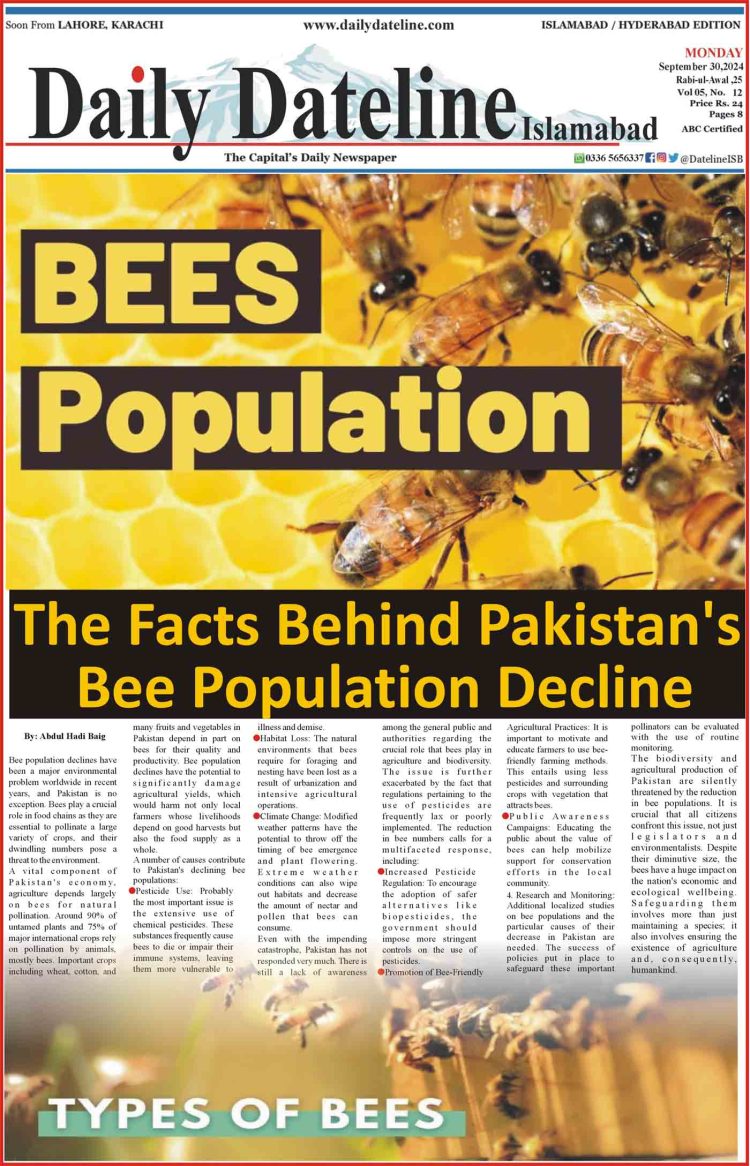By: Abdul Hadi Baig
Bee population declines have been a major environmental problem worldwide in recent years, and Pakistan is no exception. Bees play a crucial role in food chains as they are essential to pollinate a large variety of crops, and their dwindling numbers pose a threat to the environment.
A vital component of Pakistan’s economy, agriculture depends largely on bees for natural pollination. Around 90% of untamed plants and 75% of major international crops rely on pollination by animals, mostly bees. Important crops including wheat, cotton, and many fruits and vegetables in Pakistan depend in part on bees for their quality and productivity. Bee population declines have the potential to significantly damage agricultural yields, which would harm not only local farmers whose livelihoods depend on good harvests but also the food supply as a whole.
A number of causes contribute to Pakistan’s declining bee populations:
1. Pesticide Use: Probably the most important issue is the extensive use of chemical pesticides. These substances frequently cause bees to die or impair their immune systems, leaving them more vulnerable to illness and demise.
2. Habitat Loss: The natural environments that bees require for foraging and nesting have been lost as a result of urbanization and intensive agricultural operations.
3. Climate Change: Modified weather patterns have the potential to throw off the timing of bee emergence and plant flowering. Extreme weather conditions can also wipe out habitats and decrease the amount of nectar and pollen that bees can consume.
Even with the impending catastrophe, Pakistan has not responded very much. There is still a lack of awareness among the general public and authorities regarding the crucial role that bees play in agriculture and biodiversity. The issue is further exacerbated by the fact that regulations pertaining to the use of pesticides are frequently lax or poorly implemented. The reduction in bee numbers calls for a multifaceted response, including:
1. Increased Pesticide Regulation: To encourage the adoption of safer alternatives like biopesticides, the government should impose more stringent controls on the use of pesticides.
2. Promotion of Bee-Friendly Agricultural Practices: It is important to motivate and educate farmers to use bee-friendly farming methods. This entails using less pesticides and surrounding crops with vegetation that attracts bees.
3. Public Awareness Campaigns: Educating the public about the value of bees can help mobilize support for conservation efforts in the local community.
4. Research and Monitoring: Additional localized studies on bee populations and the particular causes of their decrease in Pakistan are needed. The success of policies put in place to safeguard these important pollinators can be evaluated with the use of routine monitoring.
The biodiversity and agricultural production of Pakistan are silently threatened by the reduction in bee populations. It is crucial that all citizens confront this issue, not just legislators and environmentalists. Despite their diminutive size, the bees have a huge impact on the nation’s economic and ecological wellbeing. Safeguarding them involves more than just maintaining a species; it also involves ensuring the existence of agriculture and, consequently, humankind.


















